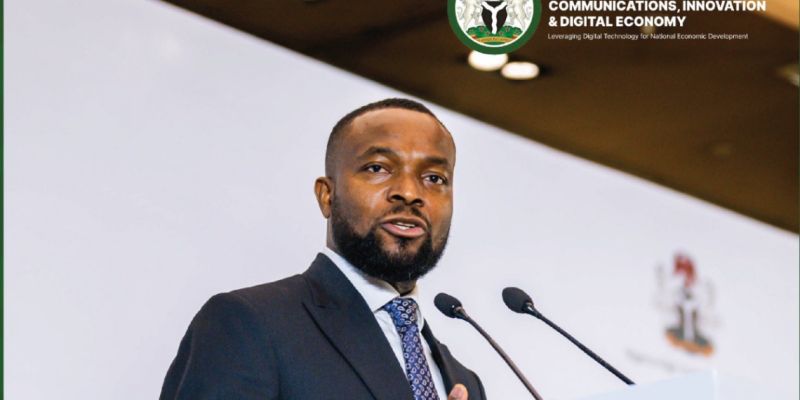The Federal Government has said that Nigeria’s Gross Domestic Product could receive a major boost from the digital economy, with contributions projected to rise to 21 per cent by 2030, if the proposed National Digital and E-Governance Bill is passed into law.
The Minister of Communications, Innovation and Digital Economy, Dr Bosun Tijani, stated this on Thursday in Abuja at a stakeholder validation workshop on the bill.
He was represented by the ministry’s Permanent Secretary, Mr Rafiu Adeladan.
Tijani described the bill as a defining step towards shaping a resilient and inclusive digital economy.
“Today marks a defining moment in our collective efforts to shape a resilient, inclusive, and future-proof digital economy for Nigeria.
“This gathering provides us with a unique opportunity to deliberate on the provisions of the Bill, validate its framework, and agree on a shared path towards its successful implementation,” he said.
He explained that the bill would anchor Nigeria’s digital transformation agenda within law, providing a strong legal and regulatory framework for digital governance, improving service delivery, and building public confidence in e-governance, digital trade, and secure transactions.
According to him, the digital economy had already made significant contributions to growth, adding N7tn to real GDP in the first quarter of 2025, representing 14.19 per cent of total GDP.
The sector, he noted, currently contributes between 16 and 18 per cent, with strategies in place to increase this to 21 per cent by 2030.
“At present, the sector contributes 16–18 per cent of GDP, with well-defined strategies to increase this to 21 per cent by 2030.
“These figures demonstrate both the current impact and the vast potential of a unified, digitally empowered economy driven by robust legislation,” he added.
He commended the National Assembly, particularly Senator Shuaib Salisu, Chairman of the Senate Committee on ICT and Cybersecurity, and Stanley Adedeji, Chairman of the House Committee on Information and Technology, for their commitment to advancing the bill.
He said their role was vital to securing Nigeria’s competitiveness in the global digital era.
The minister also highlighted the unprecedented level of stakeholder engagement that had gone into the drafting of the bill, with consultations conducted across all 36 states of the federation.
“Over the past months, an extensive nationwide stakeholder engagement has been conducted across the 36 States of the Federation.
“This historic process, facilitated by the law firm of Duale, Ovia & Alex-Adedipe, ensured that the voices and perspectives of sub-national governments, ecosystem actors, civil society, and private sector stakeholders are embedded in this Bill.
“It is the first time in our history that a legislative instrument of this nature has undergone such a broad, inclusive consultation,” he noted, acknowledging the support of partners such as the Nigerian Digital Identification for Development project.
The bill, Tijani explained, seeks to promote interoperability across ministries, departments and agencies; strengthen digital identity and secure data exchange; enhance governance processes; and drive innovation in both the public and private sectors.
He urged stakeholders to make robust contributions to the validation workshop to ensure that the bill reflects the aspirations of Nigerians.
The Director-General of the National Information Technology Development Agency, Mr Kashifu Abdullahi, stressed that inclusivity was at the core of the proposed National Digital and E-Governance Bill.
He said the broad nationwide consultations ahead of the bill’s drafting were deliberate to ensure that no group or region was left behind.
According to him, the process was not done in isolation, but with contributions from critical stakeholders across academia, industry, government, the innovation ecosystem and even venture capitalists.
He explained that accelerating digitisation would naturally promote inclusion, financial access and service delivery.
The National Commissioner and Chief Executive Officer of the Nigeria Data Protection Commission, Dr Vincent Olatunji, stressed the importance of the country’s digital ecosystem and highlighted the central role of the proposed National Digital and E-Governance Bill in driving national progress.
He urged participants at the stakeholder workshop to make robust contributions to strengthen the bill.
He further stressed that the legislation must align with the Nigeria Data Protection Act, 2023, in order to safeguard the nation’s digital ecosystem and reinforce citizens’ data privacy.
The bill seeks to provide a clear governance framework for Nigeria’s digital economy. It covers areas such as emerging technologies, digital infrastructure and literacy, while also supporting innovation.
A key provision is the transition of government records from paper-based systems to electronic platforms, a move expected to accelerate full digital transformation across sectors, improve efficiency in public service delivery, and advance national digital development.









